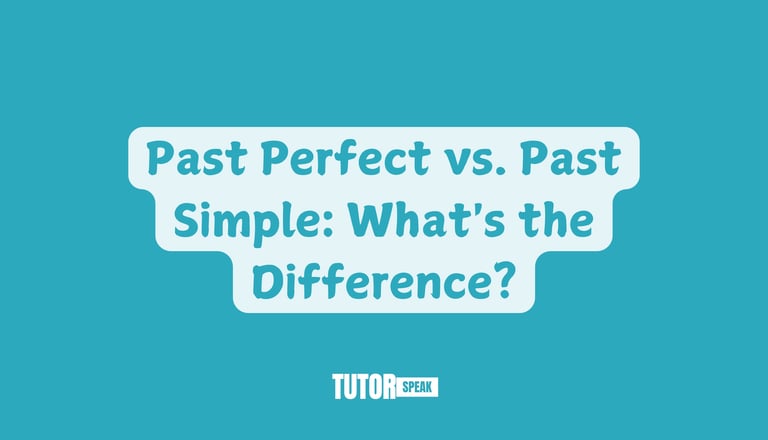Past Perfect vs. Past Simple: What's the Difference?
When talking about past events, it’s crucial to use the correct tense to convey the sequence of actions. Past Perfect and Past Simple are two essential tenses in English that can sometimes confuse learners. In this article, we will explore the differences between Past Perfect and Past Simple, explain how to use them, provide examples, correct common mistakes, and offer exercises to help you practice these tenses effectively.
TutorSpeak
3 min read


Past Perfect vs. Past Simple: What's the Difference?
When talking about past events, it’s crucial to use the correct tense to convey the sequence of actions. Past Perfect and Past Simple are two essential tenses in English that can sometimes confuse learners. In this article, we will explore the differences between Past Perfect and Past Simple, explain how to use them, provide examples, correct common mistakes, and offer exercises to help you practice these tenses effectively.
Past Perfect vs. Past Simple: Key Differences
1. Past Perfect:
The Past Perfect tense is used to talk about an action that was completed before another action in the past. It shows which action happened first. It’s often used to explain the cause or reason behind a past event.
Structure:
Subject + had + past participle
Examples:
By the time I arrived, they had left.
She had finished her homework before dinner.
They had lived in London for 5 years before they moved to Paris.
Key Points:
Used to show which action happened first: "She had already eaten when I called her."
Often used with time expressions such as by the time, before, after, when: "I had never seen such a beautiful painting before."
Describes an action completed before another past event: "By the time we arrived, the movie had started."
2. Past Simple:
The Past Simple tense is used for actions that were completed at a specific point in the past. It is often used to describe a sequence of events or actions that happen one after another. It does not focus on which action happened first.
Structure:
Subject + past tense verb
Examples:
I visited Paris last year.
They played football yesterday.
We watched a movie last weekend.
Key Points:
Used to describe an action that happened at a specific time in the past: "I studied for my exams yesterday."
Often used with time expressions like yesterday, last week, in 2005: "He left the office at 6 pm."
Describes a sequence of actions: "She woke up, got dressed, and then left the house."
Common Mistakes with Past Perfect and Past Simple
1. Mistake: "I had seen him yesterday."
Correction: "I saw him yesterday."
Explanation: The Past Perfect is not used with a specific time reference like "yesterday." The Past Simple should be used in this case because the action happened at a specific point in the past.
2. Mistake: "By the time I finished my homework, I had eaten lunch."
Correction: "By the time I finished my homework, I ate lunch."
Explanation: The Past Simple is used after time expressions like "by the time." The action of eating lunch should happen after the homework was completed, so Past Simple fits better.
3. Mistake: "She had called me after she finished her dinner."
Correction: "She called me after she had finished her dinner."
Explanation: The Past Perfect is used for the action that happens first in a sentence, while the Past Simple is used for the second action. In this case, "she had finished her dinner" should be in the Past Perfect.
4. Mistake: "They had arrived at the airport when we missed the flight."
Correction: "They arrived at the airport when we missed the flight."
Explanation: If two actions in the past occur at the same time, the Past Simple is used for both. There is no need for the Past Perfect in this case.
Exercises to Practice Past Perfect and Past Simple
Exercise 1: Fill in the blanks with the correct form of the verb (Past Perfect or Past Simple).
By the time we arrived, they __________ (already leave).
She __________ (never see) such a beautiful painting before.
After he __________ (finish) his homework, he went out to play.
They __________ (live) in Paris before moving to London.
We __________ (go) to the concert last Saturday.
I __________ (not / finish) my book before the deadline.
She __________ (call) me after she __________ (eat) lunch.
Exercise 2: Correct the mistakes in the following sentences.
By the time I arrived at the station, they had waiting for the bus.
I had already visited the museum last year.
She had written the email when I called her.
After they had finished the movie, they went to the cafe.
They had gone to bed when I was still working.
Exercise 3: Choose the correct tense (Past Perfect or Past Simple).
By the time we arrived, they __________ (had already left / left).
She __________ (had studied / studied) French for five years before she moved to Paris.
I __________ (had called / called) him after the meeting finished.
They __________ (had visited / visited) London before they went to Italy.
We __________ (had worked / worked) on the project for two hours when the power went out.
Exercise 4: Write sentences using the following prompts (Past Perfect or Past Simple).
I / eat / when / they / arrive
He / already / finish / his work / when / I called
By the time / I / reach / the station / the train / leave
She / never / be / to London / before
We / play / football / after / they / leave



